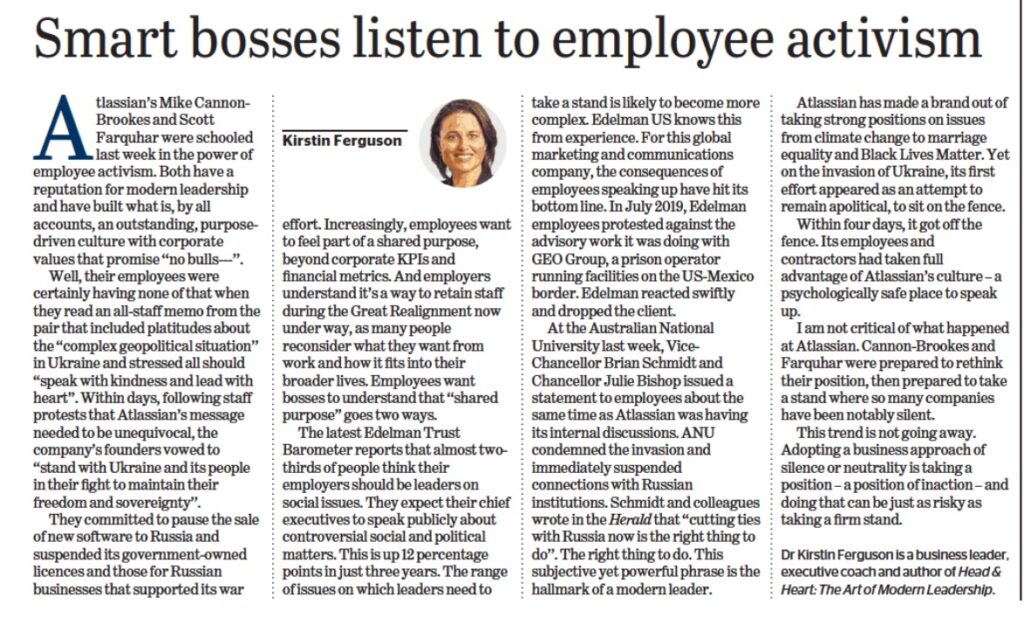
Complete the Head & Heart Leader Scale™ and receive a free, personalised report here.
Complete the Head & Heart Leader Scale™ and receive a free, personalised report here.
Kirstin Ferguson
March 7, 2022
Atlassian’s Mike Cannon-Brookes and Scott Farquhar were schooled last week in the power of employee activism. Both men have a reputation for modern leadership and have built what is, by all accounts, an outstanding, purpose-driven culture with corporate values that promise “no bullshit”.
Well, their employees were having none of that when they read an all-staff memo from the pair that included platitudes about the “complex geopolitical situation” in Ukraine and stressed that all should “speak with kindness and lead with heart”.
Within days, following protests from some staff that Atlassian’s message needed to be unequivocal, the company’s founders vowed to “stand with Ukraine and its people in their fight to maintain their freedom and sovereignty”. They committed to pause the sale of all new software to Russia and suspended its government-owned licences and those for specific Russian businesses that support its war effort.
Increasingly, employees want to feel part of a shared purpose, beyond corporate KPIs and financial metrics. And employers understand it’s a way to retain staff during the Great Realignment now under way, as many people reconsider what they want from work and how it fits into their broader lives. Employees want their bosses to understand that “shared purpose” goes two ways.
The latest Edelman Trust Barometer reports that almost two-thirds of people think their employers should be leaders on social issues. Societal leadership is now a core function of business. Employees expect their chief executives to speak publicly about controversial social and political issues. This is up 12 percentage points in just three years. The range of issues on which leaders need to take a stand is likely to become more complex.
Edelman US knows this from experience. For this global marketing and communications company, the consequences of employees speaking up have hit its bottom line. In July 2019, Edelman employees protested against the advisory work the company was doing with GEO Group, a prison operator running detention facilities on the US-Mexico border. Edelman reacted swiftly and dropped the client.
At the Australian National University last week, Vice-Chancellor Brian Schmidt and Chancellor Julie Bishop issued a statement to employees about the same time as Atlassian was having its internal discussions. ANU condemned the invasion of Ukraine and immediately suspended connections with Russian institutions. Schmidt and colleagues wrote in The Sydney Morning Herald and The Age that “cutting ties with Russia now is the right thing to do” and it put them on “the right side of history”.
The right thing to do. This subjective yet powerful phrase is the hallmark of a modern leader. Atlassian has made a brand out of taking strong positions on social issues from climate change to marriage equality and Black Lives Matter. Yet on the invasion of Ukraine, its first effort appeared as an attempt to remain apolitical, to sit on the fence. I can imagine that memo was written by a well-meaning corporate communications person.
Within four days, it got off the fence. Its employees and contractors had taken full advantage of Atlassian’s culture. That is, it’s a psychologically safe place to speak up. They told Atlassian’s founders that being apolitical was a standard they were not prepared to accept.
I am not critical of what happened at Atlassian. Cannon-Brookes and Farquhar were prepared to rethink their position. They were also prepared to take a stand where so many companies have been notably silent.
Other business leaders should ask themselves how they might handle employee activism when it comes their way. This trend is not going away. Employees are likely to get louder. Rather than remaining neutral like Switzerland (although in this case the Swiss have condemned the Russian invasion and introduced sanctions), businesses need to listen to what matters to their employees. Adopting an approach of silence or neutrality is taking a position – a position of inaction – and doing so can be just as risky as taking a firm stand.





